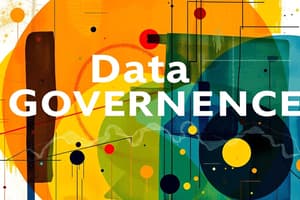Podcast
Questions and Answers
What is the primary objective of data governance?
What is the primary objective of data governance?
- To ensure data is managed consistently and ethically (correct)
- To focus solely on data storage technologies
- To accelerate data generation and utilization
- To eliminate all data-related challenges within organizations
Which of the following is NOT a component of data governance?
Which of the following is NOT a component of data governance?
- Data ownership
- Data visualization techniques (correct)
- Data quality management
- Metadata management
What challenges does Big Data introduce to traditional data governance?
What challenges does Big Data introduce to traditional data governance?
- Decreased importance of data security measures
- Simplified data management processes
- Stable data formats and limited data sources
- Increased complexity due to volume, variety, and velocity of data (correct)
How does artificial intelligence (AI) contribute to data governance?
How does artificial intelligence (AI) contribute to data governance?
Which statement best defines the relationship between data governance and data management?
Which statement best defines the relationship between data governance and data management?
Which aspect of data governance involves compliance with regulatory requirements?
Which aspect of data governance involves compliance with regulatory requirements?
What does the concept of the 3Vs in Big Data refer to?
What does the concept of the 3Vs in Big Data refer to?
What is a key challenge organizations face in implementing data governance?
What is a key challenge organizations face in implementing data governance?
What is the primary role of data governance within an organization?
What is the primary role of data governance within an organization?
Which aspect is NOT typically encompassed by data governance?
Which aspect is NOT typically encompassed by data governance?
How can artificial intelligence enhance data governance practices?
How can artificial intelligence enhance data governance practices?
What should organizations strive for in their approach to data governance and management?
What should organizations strive for in their approach to data governance and management?
Which of the following is a challenge associated with implementing data governance?
Which of the following is a challenge associated with implementing data governance?
Which statement best reflects the significance of data governance in today's context?
Which statement best reflects the significance of data governance in today's context?
What does the integration of AI in data governance primarily aim to improve?
What does the integration of AI in data governance primarily aim to improve?
What is a significant outcome of aligning data governance with data management?
What is a significant outcome of aligning data governance with data management?
What is a significant challenge related to the volume and scale of big data governance?
What is a significant challenge related to the volume and scale of big data governance?
Which aspect of governance is challenged by the integration of AI and LLM?
Which aspect of governance is challenged by the integration of AI and LLM?
What is essential for ensuring data privacy when using AI applications?
What is essential for ensuring data privacy when using AI applications?
Which key component of data governance involves assigning responsibilities for data assets?
Which key component of data governance involves assigning responsibilities for data assets?
What role do data stewards primarily play in data governance?
What role do data stewards primarily play in data governance?
What makes the implementation of data governance particularly difficult for organizations?
What makes the implementation of data governance particularly difficult for organizations?
Which of the following practices is not a responsibility of data stewards?
Which of the following practices is not a responsibility of data stewards?
What is one of the methods AI can use to enhance data governance?
What is one of the methods AI can use to enhance data governance?
How does data security relate to regulatory compliance?
How does data security relate to regulatory compliance?
Which challenge is linked to the velocity aspect of big data governance?
Which challenge is linked to the velocity aspect of big data governance?
What primary challenge does lack of data literacy present in an organization?
What primary challenge does lack of data literacy present in an organization?
What role does AI play in enhancing automated compliance monitoring?
What role does AI play in enhancing automated compliance monitoring?
Which commonality between data governance and data management focuses on data's contextual information?
Which commonality between data governance and data management focuses on data's contextual information?
How does predictive analytics contribute to data governance?
How does predictive analytics contribute to data governance?
Which of the following is NOT a shared concern of data governance and data management?
Which of the following is NOT a shared concern of data governance and data management?
What is a critical factor for successfully implementing data governance in organizations facing resource constraints?
What is a critical factor for successfully implementing data governance in organizations facing resource constraints?
What technique can help streamline metadata management in data governance?
What technique can help streamline metadata management in data governance?
Why might employees resist changes associated with data governance?
Why might employees resist changes associated with data governance?
Which of the following accurately describes cognitive automation's role in data governance?
Which of the following accurately describes cognitive automation's role in data governance?
What is an essential objective shared by both data governance and data management concerning data assets?
What is an essential objective shared by both data governance and data management concerning data assets?
Flashcards are hidden until you start studying
Study Notes
Introduction to Data Governance and AI
- Effective data governance is critical in an era characterized by vast amounts of information generated by organizations.
- Understanding data governance includes recognizing its definition, implementation challenges, and the role of AI in enhancing governance.
- Data governance and data management are interconnected, both being essential in information management.
What is Data Governance?
- Data governance involves policies, processes, and standards for managing data's quality, integrity, security, and lifecycle.
- Objectives include consistent and ethical data management compliant with regulatory requirements, addressing aspects like data ownership and privacy.
Challenges in Traditional Data Governance
- Volume, Variety, and Velocity: The exponential growth of data presents significant challenges to traditional frameworks:
- Volume: Managing huge amounts of data (petabytes) requires scalable solutions.
- Variety: Integration of diverse structured and unstructured data complicates standardization.
- Velocity: Real-time processing needs governance mechanisms that respond swiftly to data influx.
Data Governance in the AI Age
- Ethical concerns arise from AI integration, necessitating governance to prevent bias and ensure transparency.
- Complexity of AI algorithms demands updated frameworks for explainability in decision-making.
- AI applications related to personal data require robust governance to maintain privacy and comply with regulations.
AI's Role in Enhancing Data Governance
- Automated Data Quality Management: AI can detect and correct errors in data, improving overall quality.
- Predictive Analytics: Algorithms can identify potential risks and proactively address them, aiding in governance.
- Cognitive Automation: Continuous monitoring of data usage for compliance becomes efficient through AI.
Key Components of Data Governance
- Data Ownership: Assigning specific responsibilities for data management within the organization enhances accountability.
- Data Quality Management: Ensuring data accuracy through validation and cleansing processes is essential.
- Metadata Management: Effective documentation of data definitions and lineage enriches contextual understanding.
- Data Stewardship: Stewards oversee data assets, enforce policies, promote quality, and facilitate data access while ensuring compliance.
Security and Compliance in Data Governance
- Data security measures are crucial to protect sensitive data and adhere to regulations like CCPA and GDPR.
- Clear policies and standards for data management guide usage, storage, and sharing practices.
Challenges in Implementing Data Governance
- Complex Ecosystems: Diverse platforms and isolated data silos complicate establishing a unified governance framework.
- Lack of Data Literacy: Employee awareness of data governance's importance is often insufficient.
- Resistance to Change: Organizational reluctance to adopt governance practices can hinder implementation.
- Resource Constraints: Successful governance requires skilled personnel and adequate technology infrastructure.
Enhancements through AI
- AI tools automate data quality checks and improve analytics, rapidly analyzing datasets for informed decision-making.
- NLP helps manage metadata by extracting information from unstructured sources, improving data context understanding.
- Automated monitoring capabilities assist in maintaining compliance with evolving regulations.
Commonalities Between Data Governance and Data Management
- Both disciplines prioritize data quality, emphasizing accuracy and reliability for effective decision-making.
- Metadata management is crucial in providing context and clarity for data utilization in both frameworks.
- Data security measures and compliance are shared priorities in protecting data from unauthorized access.
- Managing the data lifecycle ensures data remains valuable from creation to disposal.
- Effective stakeholder collaboration is necessary for promoting a data-driven organizational culture.
Conclusion
- Data governance is pivotal in ensuring data quality, security, and ethical management in today’s data-driven world.
- AI integration provides significant improvements in governance processes, analytics, decision-making, and compliance management.
- Organizations should adopt a holistic strategy aligning data governance and management to effectively leverage data as a strategic asset while safeguarding its integrity throughout its lifecycle.
Studying That Suits You
Use AI to generate personalized quizzes and flashcards to suit your learning preferences.




